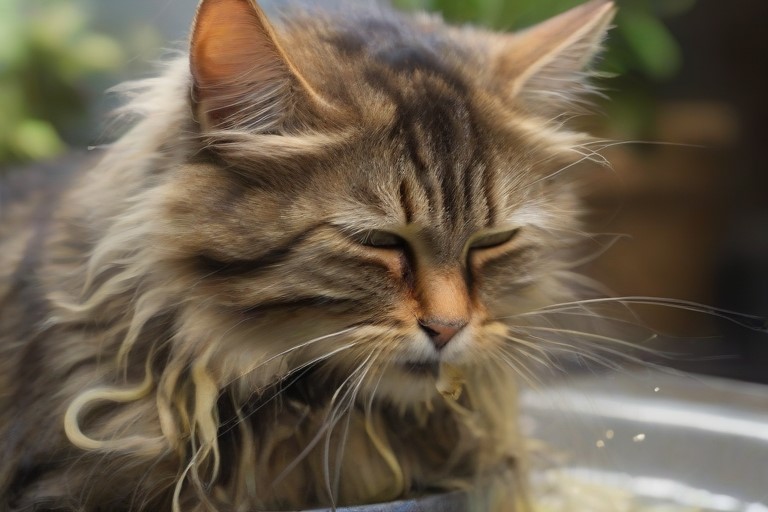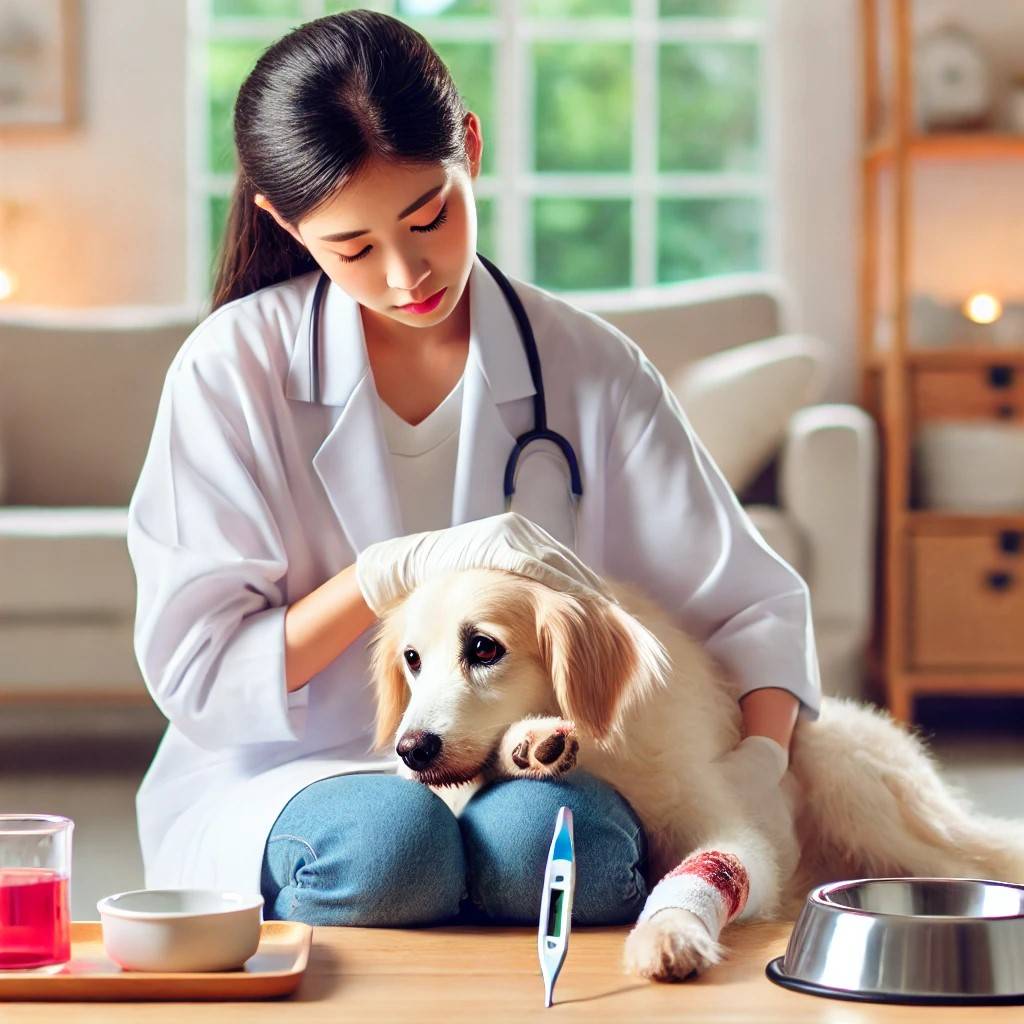Seeing your cat vomit or have diarrhea can be upsetting and concerning. These symptoms often resolve independently but indicate an underlying issue needing veterinary attention. This article explores the common causes of cat vomiting and diarrhea and provides actionable tips to help your cat feel better fast.
Key Takeaways on Cat Vomiting and Diarrhea
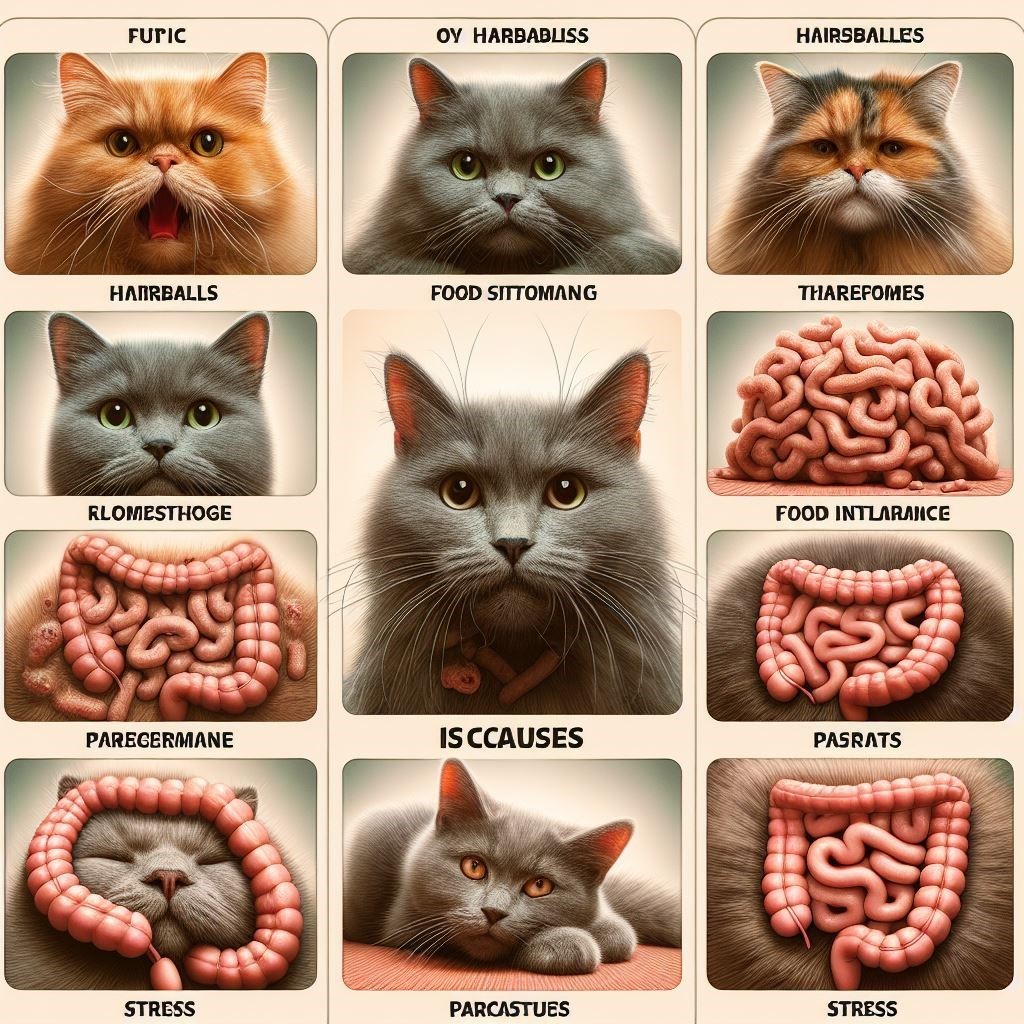
- Dietary indiscretion and infections are leading causes of acute vomiting and diarrhea episodes.
- Most mild cases resolve within 24 hours, but certain symptoms warrant an urgent vet visit.
- Tips are provided to settle upset stomachs at home through diet, probiotics, hydration, and stress reduction.
- Preventative steps outlined to help minimize future stomach upsets.
Common Causes of Cat Vomiting and Diarrhea
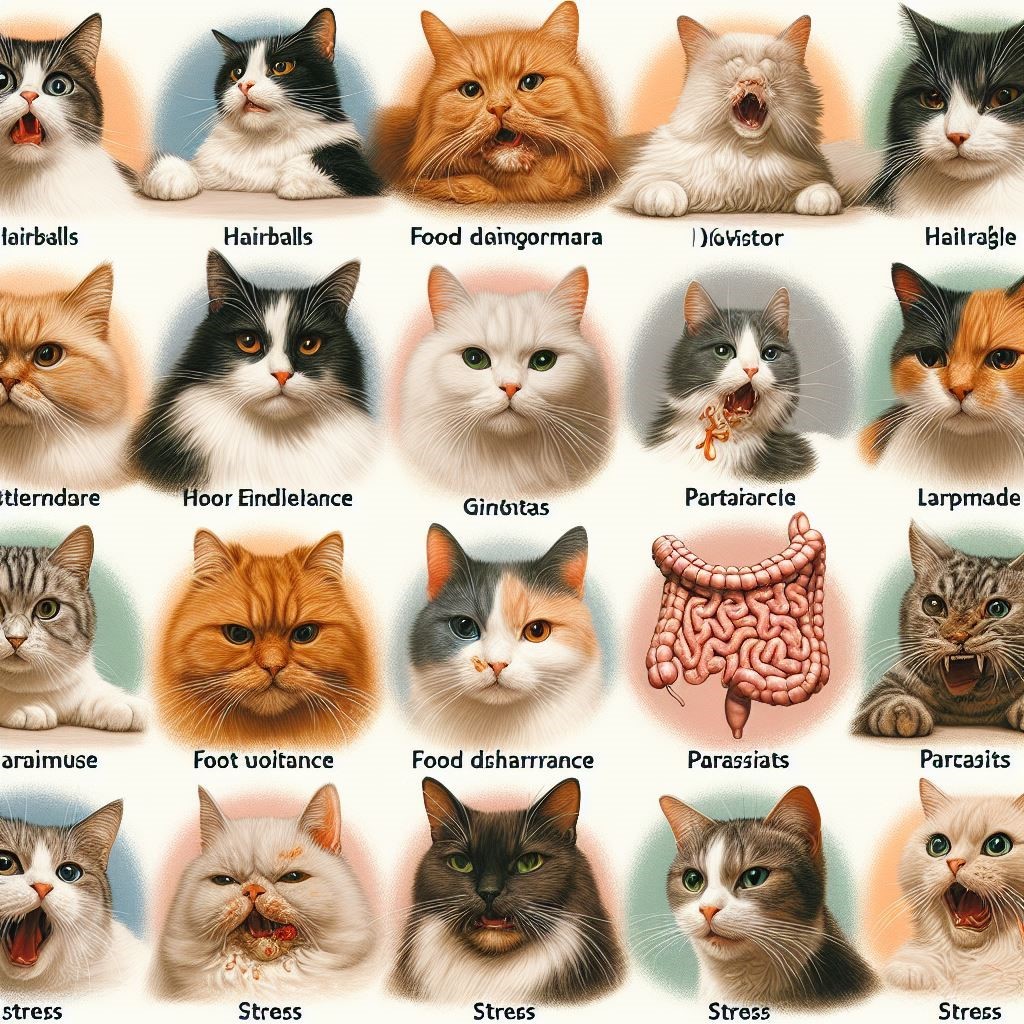
Feline vomiting and diarrhea can arise from many sources. Here are the most common culprits behind cat vomiting and diarrhea:
Dietary Indiscretion
Eating new foods, table scraps, or non-food items, raiding trash cans, and subsequent vomiting are extremely common. Their digestive systems don’t handle drastic changes well.
As they groom, cats also end up swallowing hairballs, triggering vomiting.
Infections
Bacterial, viral or parasitic bugs attacking the gastrointestinal system often lead to cat vomiting and diarrhea.
Feline panleukopenia, salmonella, and campylobacter infections are prime examples.
Foreign Bodies or Toxins
Ingesting small foreign objects, plants, or chemicals found around your home on occasion causes gastrointestinal illness.
Underlying Disease
Cats with inflammatory bowel disease (IBD), cancer, liver, or kidney disease may vomit frequently.
Medications
Antibiotics and other drugs like NSAIDs can disrupt normal gut flora and worsen nausea temporarily.
Stress
Travelling, visitors, loud noises, new pets, and other stressors may trigger anxious cats to vomit more frequently.
Is it serious? Warning Signs for Vet Visit.
Most isolated incidents of cat vomiting and diarrhea clear up within 12-24 hours if otherwise acting normally. However, contact your vet promptly if you notice any of the following:
- Repeated vomiting or diarrhea beyond 24 hours
- Lethargy and lack of appetite last over 12 hours.
- Signs of pain, including vocalizing or a hunched posture
- Fever
- Significant weight loss
- Blood or mucus in the vomit or stool
- Difficulty breathing
These red flags suggest a serious underlying issue needing quick veterinary attention. For mild cases, try the following home treatment tips.
At-Home Care Tips for Cat Vomiting and Diarrhea
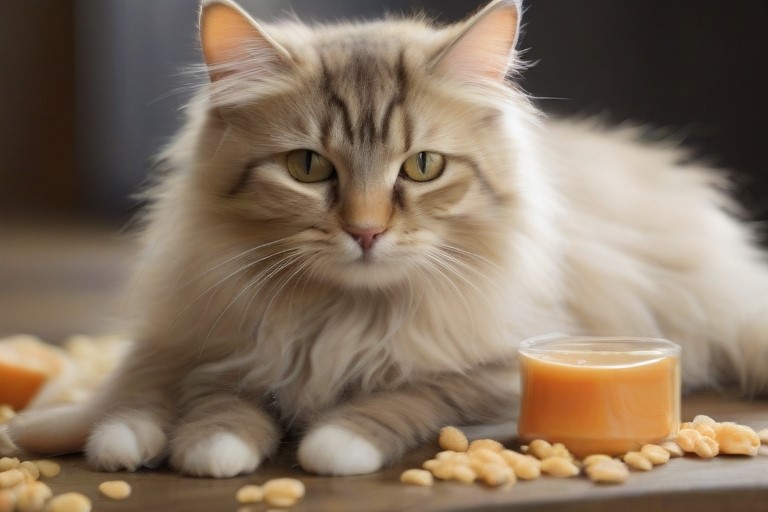
Follow these simple at-home care tips to help soothe your cat’s vomiting and diarrhea:
Remove Access to Current Food and Treats
- Withhold all food for 12-24 hours to rest their GI tract as vomiting persists. Avoid giving dairy products.
- Feed a bland diet of boiled chicken or white fish with rice or pureed pumpkin once your appetite returns.
- Reintroduce normal cat food slowly over several days mixing with the bland diet.
Keep Your Cat Well Hydrated
Dehydration is dangerous. Ensure access to plenty of clean water. Adding more bowls or a pet fountain can encourage drinking.
Focus on Stress Relief
Creating a calm environment with your cat’s favoured bedding, toys and relaxing music helps minimize anxiety and intestinal upset.
Probiotic Supplements
Giving probiotic powders labelled for gastrointestinal support replenishes healthy gut bacteria. Consult your vet on dosage for maximum benefit.
Ensure the Litter Box is Clean and Accessible
Diarrhea can come on suddenly ensure cats have easy access to a clean box to prevent accidents.
Disinfect Affected Areas
Use pet-safe cleaners to destroy lingering bacteria/viruses if vomiting or diarrhea occurs on floors, walls, or bedding.
By following these steps promptly, your cat’s bout of vomiting or diarrhea should pass quickly with no lasting effects. Always call your vet with any concerns.
Preventing Future Stomach Upsets in Cats

While occasional cat vomiting and diarrhea are normal, you can take proactive steps to help minimize recurrences:
Feed a High-Quality Diet
Choose a complete and balanced commercial cat food recommended by your vet. Update food gradually over a week by mixing increasing amounts of the new food into the old.
Stick to a Consistent Feeding Schedule
Feed meals at the same times daily rather than leaving food out to reduce overeating and indigestion.
Say No to Table Scraps
Avoid feeding your cat leftovers, raw meat, or fish since these commonly introduce new bacteria triggering stomach upset.
Ensure Constant Access to Clean Water
Staying well-hydrated minimizes constipation and supports healthy digestion and toxin elimination.
Keep Them Indoors
Outdoor cats hunt prey and eat items, increasing their risk for parasitic infections and toxicity, causing vomiting or diarrhea.
Take an Annual Exam
Your vet can check for underlying disease through annual wellness exams and lab work before issues progress.
Reduce Stress Triggers
Pay attention to triggers that make your cat anxious, such as dogs, loud noises, or changes to their routine. Use calming aids like full diffusers to help them relax regularly.
While vomiting or diarrhea can seem trivial, recognizing when professional care is required is key. Implementing basic prevention tips reduces the frequency and severity of future stomach upsets. Understand the causes, know when to call your vet and provide supportive care at home every step of the way towards your cat’s recovery.
Conclusion on Cat Vomiting and Diarrhea
In summary, occasional bouts of vomiting or diarrhea are normal in cats and clear up within 24 hours once the irritant passes out of their system. Dietary changes are the most prevalent triggers for these acute yet transient stomach upsets.
However, any repeated vomiting, diarrhea lasting over 24 hours, or other concerning symptoms warrant promptly contacting your veterinarian to rule out potential underlying disease processes. Dehydration and weight loss, specifically, can become dangerous quickly.
For mild or expected cases of cat vomiting or diarrhea, implement the supportive care strategies of withholding food briefly, restoring hydration/electrolytes, focusing on stress relief, and restoring gut health with probiotics. Return to their normal diet gradually over several days once symptoms resolve.
Cat Vomiting and diarrhea can be managed with simple steps. Feed a balanced diet, limit scraps, ensure hydration, and ease anxiety. This comprehensive approach, covering causes, vet visits, home care, and prevention, empowers you to safeguard your cat’s long-term health. If concerns persist, consult your vet for expert guidance.
FAQs About Cat Vomiting and Diarrhea
Here are the common questions about Cat Vomiting and Diarrhea and their best answers.
What should I do if my cat has diarrhea and vomiting?
If your cat is throwing up or has diarrhea, first remove their food for 6-12 hours to allow their stomach to rest. Ensure they have constant access to fresh water to stay hydrated.
You can give them plain boiled chicken and rice once their stomach settles. Reintroduce their regular food slowly over 3-4 days.
If symptoms last over 24 hours or you notice lethargy, weight loss, or other issues, take your cat to the vet promptly. Mild cases often pass within a day.
What home remedy can I give my cat for vomiting?
For occasional vomiting, the best home remedies are removing access to food briefly, ensuring easy access to fresh water, and providing a muted, comfortable area with their favoured toys or bedding.
You can also try giving a teaspoon of plain probiotic yogurt to them when they haven’t vomited for at least 6 hours to help restore digestive health. Just check with your vet on dosage first before starting probiotics.
What can I give my sick cat for diarrhea?
For diarrhea treatment at home, take away all food for 8-12 hours. This allows their GI system to rest. Make sure clean water is easily available to prevent dehydration.
Once symptoms improve, feed small amounts of boiled white meat chicken mixed with white rice. This simple, bland food is easy to digest until the diarrhea resolves. Then slowly transition them back to their regular cat food.
Should you feed a cat after it vomits?
It’s best to avoid feeding your cat for at least 6 hours after vomiting. Their stomach needs a chance to fully settle and rest before handling food again.
During this brief fast, ensure clean water is easily accessible to prevent dehydration.
Once 6 hours have passed without repeats, offer small amounts of a bland diet like boiled chicken and white rice before gradually reintroducing their regular food.
Can I treat cat diarrhea at home?
You can try treating acute diarrhea safely at home for the first 12-24 hours. Start by removing all food to give their digestive system a rest. Keep an eye on their water intake.
After 8 hours without symptoms, slowly reintroduce a bland, easily digestible diet of plain protein and rice mixed in. White meat chicken or fish with white rice or mashed pumpkin works well.
If diarrhea continues for more than 24 hours, take your cat to the vet, as it may need hydration therapy or other medical treatment.
What do you feed a cat after vomiting?
The simplest option is to temporarily feed your cat plain boiled chicken mixed with white rice once their stomach has rested 6+ hours post-vomiting. Or you can mash together cooked chicken breast with canned pureed pumpkin.
Give a few small portions of this bland meal over 24 hours. Then slowly mix increasing amounts of their regular food in over 3-4 days if no further vomiting occurs. Keep a close eye on them and contact your vet if symptoms or other concerns return.
Recommended reading
Dog Vomiting and Diarrhea: A Quick Owner’s Guide

Adel Galal is a health and wellness writer with over 30 years of experience studying and writing about health, fitness, nutrition, and healthy living. He is the founder of NextFitLife.com, where he shares practical, evidence-based guidance to support long-term health at any age. Adel’s mission is simple:
to help people make smarter health choices that fit real life, at any age.

